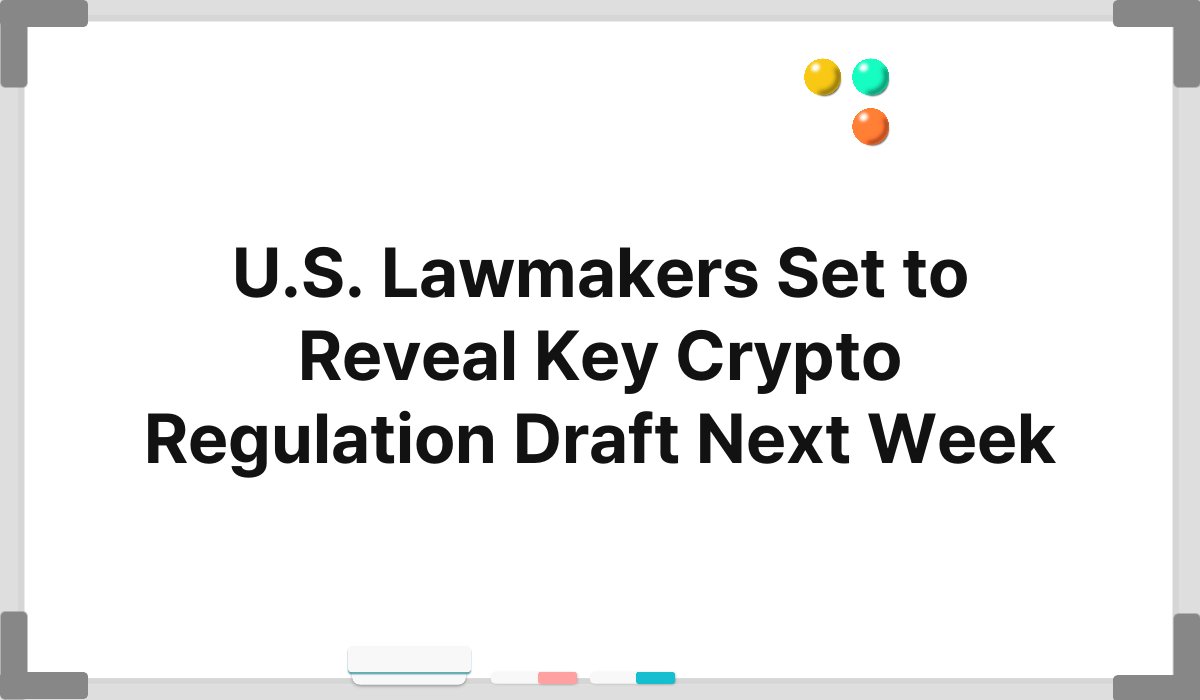[K-Bridge/Samuel] U.S.
lawmakers are preparing to unveil a significant draft for cryptocurrency regulation next week, marking a pivotal moment in the evolving landscape of digital assets.
This draft aims to provide a comprehensive framework that addresses the complexities and challenges associated with cryptocurrencies.
As the market continues to grow, the need for clear regulatory guidelines becomes increasingly crucial to ensure investor protection and market integrity.
The upcoming announcement is expected to shed light on how lawmakers plan to balance innovation with necessary oversight.
By reading this article, you will gain insights into the key elements of the proposed regulation, its potential impact on the cryptocurrency market, and the broader implications for investors and businesses alike.
The Importance of U.S.
Lawmakers Setting Key Crypto Regulation Draft Next Week
The Context of Cryptocurrency Regulation
The cryptocurrency market has seen explosive growth over the past decade, with Bitcoin and other digital currencies gaining significant traction among investors and institutions.
This rapid expansion has prompted concerns regarding market manipulation, fraud, and the overall security of digital assets.
As a result, U.S.
lawmakers have recognized the urgent need for a regulatory framework that can effectively govern this emerging sector.
The upcoming draft is expected to address these issues head-on, providing clarity on how cryptocurrencies should be classified and regulated.
The context in which this regulation is being developed is also shaped by international efforts to establish guidelines for digital assets.
Countries around the world are grappling with similar challenges, leading to a patchwork of regulations that can create confusion for global investors.
By establishing a clear regulatory framework, U.S.
lawmakers hope to position the country as a leader in the digital economy while ensuring that investors are protected from potential risks.
Furthermore, the dialogue surrounding cryptocurrency regulation is not just about compliance; it also encompasses innovation.
Lawmakers are aware that overly stringent regulations could stifle the growth of the industry and hinder technological advancements.
Therefore, striking a balance between regulation and innovation is a key consideration in the upcoming draft.
The Role of Stakeholders in the Regulatory Process
The development of the cryptocurrency regulation draft involves various stakeholders, including industry representatives, consumer advocates, and regulatory bodies.
Each group has its own perspectives and interests, making it essential for lawmakers to engage in meaningful dialogue.
Industry representatives often advocate for regulations that foster innovation and provide certainty, while consumer advocates emphasize the need for robust protections against fraud and abuse.
This collaborative approach aims to create a regulatory environment that is both fair and conducive to growth.
By involving multiple stakeholders, lawmakers can better understand the nuances of the cryptocurrency market and the potential implications of their decisions.
This engagement is critical in ensuring that the final draft reflects a comprehensive understanding of the challenges and opportunities presented by digital assets.
Moreover, the input from various stakeholders can help lawmakers anticipate potential unintended consequences of the proposed regulations.
By considering diverse viewpoints, they can craft a framework that mitigates risks while promoting a healthy and competitive market.
The Impact of Global Trends on U.S.
Regulation
Global trends in cryptocurrency regulation will likely influence the U.S.
draft, as lawmakers seek to align with international standards.
Countries such as the European Union and the United Kingdom are already implementing their own regulatory frameworks, which may serve as models for U.S.
lawmakers.
This international perspective is crucial, as it can help prevent regulatory arbitrage, where companies exploit differences in regulations across jurisdictions.
Additionally, the global nature of cryptocurrency markets means that U.S.
regulations will need to consider the implications of cross-border transactions.
As digital assets do not adhere to geographical boundaries, regulations must account for the potential risks associated with international trading and investment.
This complexity adds another layer of consideration for lawmakers as they finalize the draft.
Furthermore, the increasing involvement of institutional investors in the cryptocurrency market has raised the stakes for regulatory clarity.
As more traditional financial institutions enter the space, the need for a coherent regulatory framework becomes even more pressing.
Lawmakers must ensure that their regulations not only protect retail investors but also provide a stable environment for institutional participation.
Key Components of the Proposed Regulation
Classification of Cryptocurrencies
One of the primary components of the upcoming regulation draft will be the classification of cryptocurrencies.
Lawmakers are expected to provide clear definitions that distinguish between different types of digital assets, such as utility tokens, security tokens, and stablecoins.
This classification is essential for determining the applicable regulatory requirements for each category.
By establishing clear definitions, lawmakers can create a framework that provides certainty for businesses and investors.
For instance, security tokens may be subject to stricter regulations akin to traditional securities, while utility tokens could have more lenient requirements.
This differentiation will help clarify the legal status of various cryptocurrencies and guide market participants in their compliance efforts.
Additionally, the classification of cryptocurrencies will have implications for taxation and reporting requirements.
By clearly defining each type of digital asset, lawmakers can ensure that tax obligations are appropriately aligned with the nature of the asset.
This clarity will be crucial for both individual investors and businesses operating in the cryptocurrency space.
Consumer Protection Measures
Consumer protection is a central theme in the upcoming regulation draft, as lawmakers aim to safeguard investors from fraud and other risks associated with cryptocurrencies.
The draft is expected to include provisions that require cryptocurrency exchanges and platforms to implement robust security measures to protect user funds.
This may involve mandating the use of cold storage, multi-signature wallets, and regular security audits.
Moreover, the regulation may also address transparency requirements for cryptocurrency projects.
Lawmakers could require that initial coin offerings (ICOs) and token sales provide clear disclosures regarding the risks involved and the intended use of funds.
By enhancing transparency, lawmakers hope to empower consumers to make informed decisions when investing in digital assets.
Another critical aspect of consumer protection will be the establishment of mechanisms for dispute resolution.
The draft may propose the creation of regulatory bodies or frameworks that facilitate the resolution of disputes between consumers and cryptocurrency platforms.
This will provide investors with a clear avenue for recourse in cases of fraud or misconduct.
Compliance and Reporting Obligations
The upcoming regulation draft is likely to impose compliance and reporting obligations on cryptocurrency businesses, including exchanges, wallets, and issuers of digital assets.
These obligations may require companies to register with regulatory authorities and adhere to anti-money laundering (AML) and know-your-customer (KYC) regulations.
By implementing these measures, lawmakers aim to enhance the integrity of the cryptocurrency market and prevent illicit activities.
Compliance obligations will also extend to transaction reporting.
Cryptocurrency businesses may be required to report large transactions or suspicious activities to regulatory authorities.
This will help create a more transparent environment and deter potential abuses within the market.
Furthermore, the regulation may outline penalties for non-compliance, ensuring that businesses take their obligations seriously.
By establishing a clear framework for compliance, lawmakers hope to foster a culture of accountability within the cryptocurrency industry.
Challenges in Implementing Cryptocurrency Regulation
Balancing Innovation with Regulation
One of the most significant challenges in implementing cryptocurrency regulation is finding the right balance between fostering innovation and ensuring adequate oversight.
Lawmakers must navigate the delicate line between creating a regulatory environment that encourages technological advancements while protecting consumers from potential risks.
Overly restrictive regulations could stifle innovation and drive businesses to operate in jurisdictions with more favorable conditions.
To address this challenge, lawmakers may consider adopting a phased approach to regulation.
This could involve initially implementing basic regulatory frameworks while allowing for flexibility and adaptation as the market evolves.
By taking a gradual approach, lawmakers can assess the impact of regulations and make necessary adjustments to support innovation.
Additionally, engaging with industry stakeholders throughout the regulatory process can help lawmakers gain insights into the needs and concerns of businesses.
This collaborative approach can lead to more effective regulations that promote growth while safeguarding investors.
Addressing Regulatory Arbitrage
Regulatory arbitrage poses a significant challenge in the cryptocurrency space, as businesses may seek to exploit differences in regulations across jurisdictions.
As countries develop their own regulatory frameworks, lawmakers must ensure that U.S.
regulations are not overly burdensome, which could drive companies to operate in less regulated markets.
To combat regulatory arbitrage, U.S.
lawmakers may consider collaborating with international counterparts to establish harmonized standards for cryptocurrency regulation.
By working together, countries can create a more consistent regulatory environment that minimizes discrepancies and promotes fair competition.
Furthermore, lawmakers may need to implement mechanisms to monitor and address potential abuses of regulatory arbitrage.
This could involve increasing oversight of cryptocurrency businesses operating across borders to ensure compliance with U.S.
regulations.
Adapting to Rapid Market Changes
The cryptocurrency market is characterized by its rapid evolution, with new technologies and trends emerging at an unprecedented pace.
This dynamic nature poses a challenge for lawmakers tasked with creating regulations that remain relevant and effective over time.
As new digital assets and financial products enter the market, regulations must be adaptable to accommodate these changes.
To address this challenge, lawmakers may consider implementing a regulatory framework that allows for periodic reviews and updates.
By establishing a process for ongoing evaluation, lawmakers can ensure that regulations remain aligned with market developments and technological advancements.
Additionally, fostering a culture of innovation within regulatory bodies can help them stay ahead of emerging trends.
By encouraging regulators to engage with industry experts and stay informed about new technologies, lawmakers can create a more responsive regulatory environment.
The Future of Cryptocurrency Regulation in the U.S.
Long-Term Implications for the Market
The forthcoming cryptocurrency regulation draft is poised to have significant long-term implications for the market.
By establishing clear guidelines, lawmakers can provide a stable environment that encourages investment and fosters innovation.
This regulatory clarity is essential for attracting institutional investors, who have been hesitant to enter the market due to uncertainties surrounding compliance.
Moreover, a well-structured regulatory framework can enhance the overall legitimacy of the cryptocurrency industry.
As regulations become more defined, consumers may feel more confident in participating in the market, leading to increased adoption of digital assets.
This shift could contribute to the maturation of the cryptocurrency ecosystem, paving the way for new opportunities and advancements.
Potential for International Leadership
The U.S.
has the potential to position itself as a global leader in cryptocurrency regulation.
By developing a comprehensive and balanced regulatory framework, lawmakers can set a precedent for other countries to follow.
This leadership can enhance the U.S.’s standing in the global digital economy, attracting businesses and investors seeking a favorable regulatory environment.
Furthermore, as international discussions regarding cryptocurrency regulation continue, U.S.
lawmakers can play a pivotal role in shaping global standards.
By actively engaging with international counterparts, the U.S.
can advocate for regulations that promote innovation while ensuring consumer protection.
The Role of Technology in Compliance
As the regulatory landscape evolves, technology will play a crucial role in facilitating compliance for cryptocurrency businesses.
Innovations such as blockchain analytics tools and automated reporting systems can help companies meet their regulatory obligations more efficiently.
By leveraging technology, businesses can streamline compliance processes, reducing the burden of regulatory requirements.
Additionally, advancements in technology can enhance transparency within the cryptocurrency market.
By utilizing blockchain technology, companies can provide real-time visibility into transactions, helping to build trust among consumers and regulators alike.
This technological integration will be vital in ensuring that the cryptocurrency industry operates in a compliant and responsible manner.
Conclusion
The upcoming draft of cryptocurrency regulation by U.S.
lawmakers represents a critical step in shaping the future of the digital asset landscape.
By addressing key issues such as classification, consumer protection, and compliance, lawmakers aim to create a framework that balances innovation with necessary oversight.
The challenges of regulatory arbitrage and rapid market changes will require thoughtful consideration as the draft is finalized.
As the U.S.
prepares to unveil this important regulation, the implications for the cryptocurrency market are profound.
With the potential to foster growth, enhance consumer confidence, and position the U.S.
as a global leader in digital asset regulation, the upcoming draft will undoubtedly shape the trajectory of the industry for years to come.








